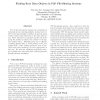Free Online Productivity Tools
i2Speak
i2Symbol
i2OCR
iTex2Img
iWeb2Print
iWeb2Shot
i2Type
iPdf2Split
iPdf2Merge
i2Bopomofo
i2Arabic
i2Style
i2Image
i2PDF
iLatex2Rtf
Sci2ools
104
click to vote
P2P
2005
IEEE
2005
IEEE
Finding Rare Data Objects in P2P File-Sharing Systems
Peer-to-peer file-sharing systems have hundreds of thousands of users sharing petabytes of data, however, their search functionality is limited. In general, query results contain many references to the same data object. These references are grouped, and the size of the group–the number of references it contains–is the typical ranking metric. Although group size is effective in finding popular data, it works poorly for rare, less popular data. Other ranking functions, such as precision and cosine similarity, are more appropriate in this case. We show the significant performance benefit in finding rare data using these ranking functions through extensive simulation.
Related Content
| Added | 25 Jun 2010 |
| Updated | 25 Jun 2010 |
| Type | Conference |
| Year | 2005 |
| Where | P2P |
| Authors | Wai Gen Yee, Dongmei Jia, Ophir Frieder |
Comments (0)

